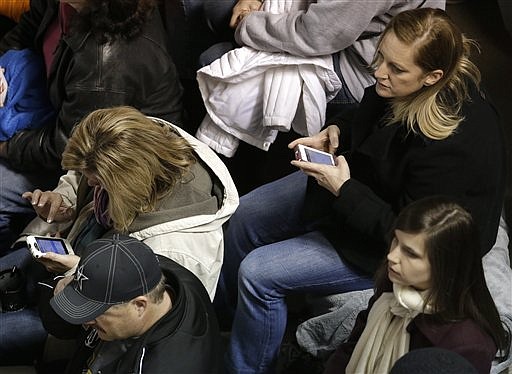NASHVILLE, Tenn. (AP) - A popular question asked during SEC games this season has been: Do you have any service?
The increasing number of fans unhappy their smartphones and tablets aren't working has become a priority for the mighty Southeastern Conference. The need for more bandwidth at stadiums is a hot-button issue being studied by a fan experience group approved by league presidents and chancellors earlier this year.
The league is trying to take action before fans do.
"I've kind of resigned myself to the fact that checking scores and all that is not possible," said Alabama fan Chad Gilbert. "It really kind of negatively impacts your experience and almost makes it not even fun to go ... You want to follow your other teams' scores or post a picture of your seats. You're kind of shut off from society for a few hours. Obviously, the main reason you're there is to watch the game, but you'd like to communicate with people and share your experience."
Gilbert from Memphis, Tenn., has been a Crimson Tide season-ticket holder since graduating from Alabama nearly a decade ago. He said he's heard before each of the last couple of seasons that getting a connection on his smartphone would be easier - only to be disappointed. He said checking Twitter, Facebook or scores becomes impossible at Alabama's 101,821-seat stadium about three hours before kickoff until about an hour after the game ends.
"I can't do anything on my mobile device because it's so bogged down, and it's mostly people who have my carrier who have that issue. I pretty much know on game day after a certain time it's almost useless to even try," Gilbert said.
The fix seems to be more equipment - antennas, mobile boosters and cell towers.
The challenge for the SEC is coming up with a uniform solution.
The league has its own wireless contract with AT&T, which gives officials control over championship events. But each SEC school has individual deals with wireless providers, so reception varies from stadium to stadium. SEC officials have even talked to the NFL for tips on how to resolve the issue.
"Quite frankly, a lot of that is the cell carriers are trying to keep up as much as they can, and I know we've had some additional strength added from the companies that service our area," said Mississippi State athletic director Scott Stricklin, chairman of the SEC fan experience study group.
Several other schools have also added equipment.
Alabama and Florida added antennas before this season to improve the strength and capacity of wireless networks at their football stadiums. Tennessee announced new installations to help cell reception at Neyland Stadium in 2012. South Carolina worked with Verizon to bring in a mobile cell site called Cell on Wheels to double capacity around Williams-Brice Stadium.
While that's made the situation better, schools can't keep up with the technology.
Herb Vincent, LSU's associate vice chancellor for communications, said there is not "an easy fix."
Alabama found that out that not even the new antenna network was enough and added more cell servers before hosting Mississippi State on Oct. 27. Milton Overton, who oversees technology for Alabama, said they found text messages didn't go through sometimes until an hour two after games, and Tide officials will survey fans again at the end of the season to check for issues.
"Any sports venue today, they expect it to be connected," Overton said.
The SEC's popularity only adds to the problem.
SEC games create mini-cities: Tennessee's capacity is 102,455 with Georgia and LSU both over 92,000. Gilbert said he managed to connect when his Crimson Tide played at Missouri in October - but only after a big rain storm sent thousands of fans home early in the second quarter.
Not even Vanderbilt, the SEC's smallest stadium seating 40,350, is immune.
Chris Cashwell, 43, of Franklin, Tenn., uses Twitter to enhance his game-day experience at Vanderbilt with injury updates, notes and opinions from others on plays he couldn't see. Cashwell said he quickly got dependent on Twitter and had no issues against teams like Presbyterian or Massachusetts only to be unable to connect against any SEC opponent. Luckily, his son's new 4G iPhone helped him check Twitter when Tennessee benched Tyler Bray last weekend.
Cashwell's 14-year-old son also pointed out why his cell battery was nearly dead after a game.
"He said, 'That's because you were trying to post to Twitter and Facebook the whole time so it was looking for that signal and running it down,'" Cashwell said.
Vanderbilt asked its wireless providers to test their systems for weaknesses during home games this fall so they can add enough equipment to meet demand next season. Steve Walsh, Vanderbilt's associate director of athletics and director of sales and marketing, said the Commodores want to make better use of their new video board to post Twitter comments and Facebook updates to expand on the replays already being shown to meet fan demand.
Alabama already does that with Facebook posts - when they go through.
"We definitely recognize it as an issue that's not going away anytime soon," Walsh said. "It's going to continue to become a larger story."
SEC fans should stay tuned - if they can stay connected.
AP Sports Writers John Zenor in Birmingham, Ala., Mark Long in Gainesville, Fla., David Brandt in Starkville, Miss., Steve Megargee in Knoxville, Tenn., Pete Iacobelli in Columbia, S.C., and Brett Martel in Baton Rouge, La., contributed to this report.

